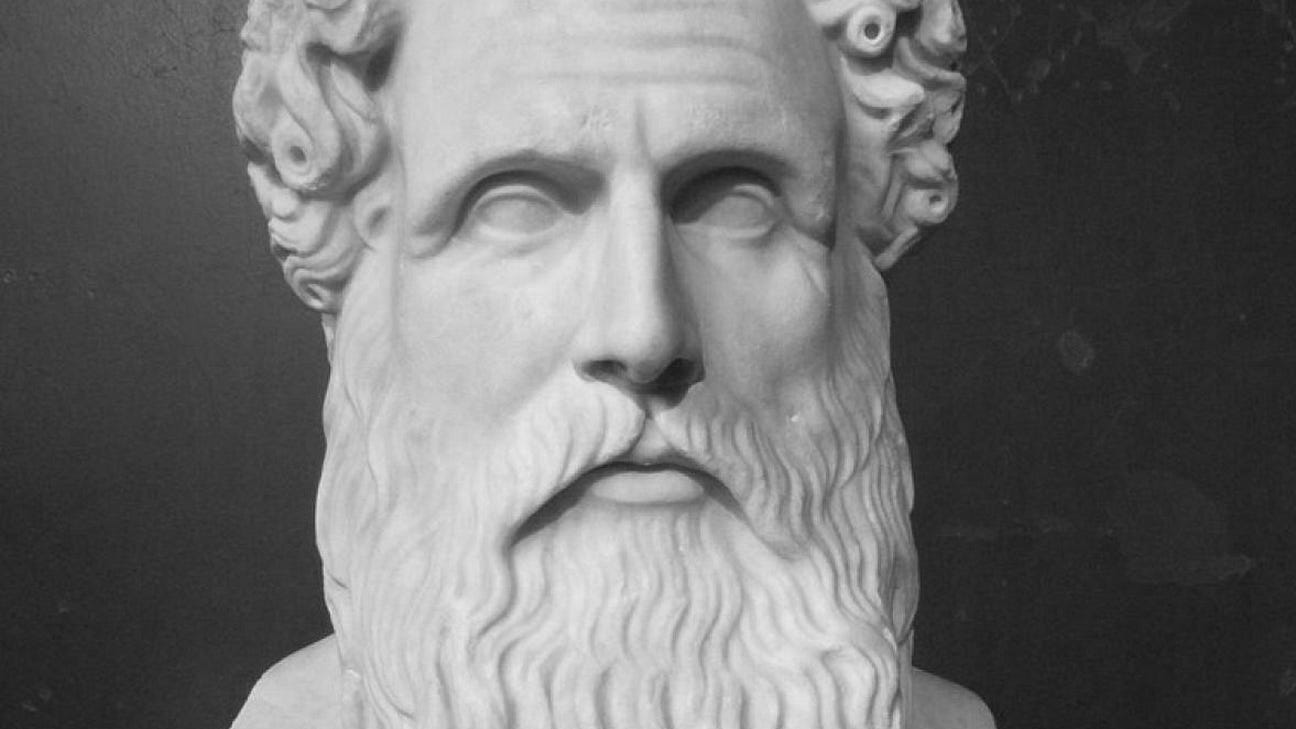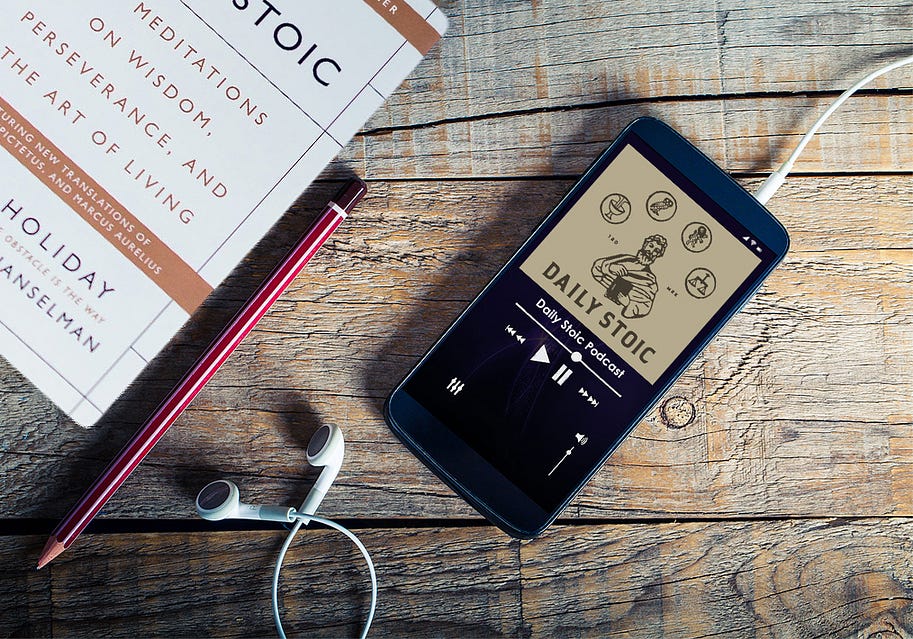
Around 9 a.m. when millions of people are checking sports scores and scouring Twitter, about 300,000 people are starting their day with something different.
Stoicism.
This ancient philosophy that emphasizes the values of temperance, detachment, and discipline originated in Ancient Greece, but today it lives in the email inboxes of professional athletes, entrepreneurs, politicians, and working class folks alike.
The catalyst? Daily Stoic: a worldwide community that applies the principles of ancient Stoic wisdom to modern life — founded by a college dropout.
But before we learn about Stoicism’s digital renaissance, we have to go back to the beginning, to the Stoa Poikile.
What Is Stoicism?
 About 2,300 years ago, a haggard man named Zeno sat down at the Stoa Poikile (Painted Porch) in Athens to teach people that discipline — not pleasure — was the key to the Good Life. Zeno was a wealthy merchant destined to follow in his father’s footsteps. But just as he was entering the prime of his career, his life took a surprising twist. On a voyage from Phoenicia to Athens, his ship sank along with his possessions.
About 2,300 years ago, a haggard man named Zeno sat down at the Stoa Poikile (Painted Porch) in Athens to teach people that discipline — not pleasure — was the key to the Good Life. Zeno was a wealthy merchant destined to follow in his father’s footsteps. But just as he was entering the prime of his career, his life took a surprising twist. On a voyage from Phoenicia to Athens, his ship sank along with his possessions.
While stranded, he picked up a copy of Socrates’ dialogues. Zeno was so enthralled that he asked the bookkeeper where he could meet philosophers like this. From there, he studied under the most influential thinkers of his era: Crates of Thebes, Stilpo, and Philo — all of whom laid the foundations for his own teachings.
Despite his wealth, Zeno lived an ascetic life. He understood that people suffered because they pursued possessions instead of virtue. According to the ancient biographer Diogenes Laertius, Zeno joked, “Now that I’ve suffered shipwreck, I’m on a good journey.”
Zeno’s students were initially called Zenonians, but later came to be known as Stoics — a tribute to the Stoa Poikile where they gathered.
From the beginning, it was clear that Stoicism would be different from other philosophies.
For starters, it was taught in a public space while others were reserved for private classrooms. It was also action-oriented. The Stoics weren’t interested in arcane theories — their goal was self-mastery, which could be accomplished by practicing four virtues:
Courage: stay true to yourself
Temperance: control your impulses
Justice: do the right thing
Wisdom: pursue truth
Stoicism quickly became the most popular philosophy in the Roman Empire, and for good reason. It was relevant for the rich and the poor, the powerful and the meek alike.
In fact, the three most popular Stoics were a political advisor (Seneca), a former slave (Epictetus), and a Roman emperor (Marcus Aurelius). Their insights — along with many others — have helped countless people overcome adversity and find meaning.
To sum up Stoicism in one sentence: we don’t always control what happens to us, but we always control how we respond — a timely adage if there ever was one.
Despite its practicality, Stoicism was largely the focus of scholars and historians in the post-Enlightenment era. Of course, the term “Stoic philosophy” doesn’t exactly do itself much justice today.
The adjective “stoic” has become misconstrued with emotionlessness; and the word “philosophy” conjures up images of stuffy professors and thick textbooks. But Stoic philosophy differs from lecture-room philosophy in one distinct sense: It’s not something you believe or study, it’s something you do. It’s a way of life.
Taking Stoicism from ivory towers into the real world would require the work of someone intellectual yet tech savvy — perhaps someone a bit controversial.
Stoicism Gets an Unlikely Advocate

Ryan Holiday isn’t exactly the poster boy for philosophy.
As American Apparel’s twenty-year-old marketing director, he deliberately ran ads that violated the policies of publishers’ websites, just for the publicity. As Tucker Max’s publicist, he started fake boycott groups and defaced his own billboards, knowing reporters wouldn’t be able to resist the outrage. Faking lawsuits, leaking documents, emailing from fake addresses — if it could help his clients sell something, Ryan Holiday wasn’t above it.
Then he exposed his secrets in the polarizing tell-all book Trust Me I’m Lying — all before he turned 30.
“I was disgusted with how it all worked,” Ryan told The New York Times. “The idea of the book was, I’m going to put all these things in a giant pile and light them on fire.”
At the same time he was pulling off shameless publicity stunts, this self-proclaimed media manipulator was quietly piquing his audience’s interest in something much different than marketing:
Stoicism.
In 2009, Ryan wrote Stoicism 101: A Practical Guide for Entrepreneurs as a guest post on Tim Ferriss’ blog, which generated nearly 400 comments. From there, he published more blog posts on his own site and recommended dozens of Stoic-inspired books in his monthly reading recommendation emails.
By 2014, just two years after everyone pegged Ryan Holiday as the Don Draper of digital, he took a pay cut from his publisher to write The Obstacle Is the Way: The Timeless Art of Turning Trials into Triumph.
On Amazon, it’s categorized under “Philosophy Movements,” but the book is the antithesis of what you’d find on a college syllabus. The pages are packed with enthralling stories of people like John D. Rockefeller, Steve Jobs, and Amelia Earhart applying the timeless principles of Stoicism to overcome adversity in pursuit of greatness.
“No one wakes up and says, ‘I need philosophy today,’” says Holiday. “Instead, they wake up with problems they need solutions to.”
It’s a peculiar — but ultimately empowering — hybrid of history, psychology, philosophy, and self-help. Nobody knew if Stoicism would gain as much traction today as it did on the Stoa Poikile — even with a master publicist behind it.
And then the numbers came out: 30,000 copies sold in just six weeks.
But that was just the beginning.
Stoicism Garners a Cult Following
Arnold Schwarzenegger. Nick Saban. LL Cool J.
 These are just a few public figures who have a copy of The Obstacle Is the Way on their bookshelf, along with half a million others. But the case of how Stoicism became the self improvement strategy du jour is a curious one.
These are just a few public figures who have a copy of The Obstacle Is the Way on their bookshelf, along with half a million others. But the case of how Stoicism became the self improvement strategy du jour is a curious one.
There are no viral “life hacks,” miraculous claims, or A-list celebrity endorsements. No split screen appearance on The Today Show. And yet, the book made its way into the New England Patriots’ locker room on the way to their 2014 Super Bowl Victory.
There’s something about the book’s message that transcends socioeconomics, race, gender, age, and location. Something, as the subtitle emphasizes, timeless.
Ryan Holiday is a marketer by trade, which raises the question: Was popularizing Stoicism his plan all along?
“It did strike me when I first read the Stoics that this was way more practical and relevant than the esoteric academic and Wikipedia definitions of philosophy,” says Ryan. “But I definitely didn’t see it exploding quite the way it has.”
Ryan points out that Stoicism tends to have resurgences when times get tough. “Often people look to Stoicism to get them through periods where there are large societal shifts that they can’t control.”
It makes perfect sense that today, in the midst of civil unrest and a global pandemic, people find solace in repeating that powerful dictum: I don’t always control the world around me, but I can control how I respond.
Building on the runaway success of The Obstacle Is the Way, Ryan launched a new venture to introduce Stoicism to a wider audience, Daily Stoic: an online resource dedicated to solving everyday problems with ancient wisdom.
The bread and butter of Daily Stoic is their newsletter. Each morning, Ryan sends a short (~500 word) note inspired by prominent Stoics. October 7th’s email included an anecdote about Marcus Aurelius’ response to the Antonine plague, which killed over 60 million people, and how we can heed his wisdom to endure the nightmare we’re currently experiencing.
One would think simplifying and sharing this once-obscure wisdom with the masses is a noble pursuit. But not everyone was happy with Stoicism’s renaissance.
Can Philosophy Be Too “Trendy?”
Whether it’s a stuffy university professor or an irate Instagram follower, there have always been critics of Ryan’s modern interpretation of Stoicism. These philosophy “purists” argue that Stoicism should never be monetized via sponsors or “diluted” into bite-sized snippets in an email.
A constant barrage of cheap shots might discourage some people. But Ryan holds his reputation as Stoicism’s publicist with great pride.
“Of all the horrible things to be accused of, making philosophy popular and accessible doesn’t feel like a particularly bad one,” he says. “Some people want to keep these ideas hopelessly obscure and opaque so they and their university buddies can debate them for a living… and pretend that isn’t ‘monetizing’ philosophy either. They’re just doing it on the taxpayer and student dime.”
The name Stoicism derives from the Stoa Poikile, or “painted porch,” which was one of the primary places to share ideas 2,000+ years ago. But today, we don’t share ideas on a porch. We read emails, listen to podcasts, and watch videos. This is how Stoicism will spread, and Ryan is willing to do whatever it takes to generate the funds to make it happen.
“That we fund Daily Stoic by selling products to people who want to buy them seems more than fair,” he says. “That we sometimes accept ads for the podcast or email, like most other content providers, including the New York Times…only a crazy, entitled person would be upset by this.”
Purists might be complaining that modern audiences aren’t absorbing “authentic” Stoicism. But ironically, Daily Stoic is driving unprecedented sales of the original texts. As of today, Marcus Aurelius’ Meditations has nearly 8,000 reviews on Amazon.
“At the end of my books I always have a ton of suggestions for primary sources to go to next,” says Ryan. “I love seeing the spike in sales of the classic texts from Marcus Aurelius and Seneca and Epictetus. I feel like I’m paying forward what was done for me.”
Daily Stoic Makes Philosophy More Accessible Than Ever

Since launching Daily Stoic in 2016, Ryan and his team have sent over 130 million emails — the equivalent of four full-length books. They’ve amassed an audience of more than 300,000 and maintained the same open rate for six years — a testament to their audience’s devotion.
While the morning newsletter is the hallmark of Daily Stoic, it has gradually expanded into a niche empire. As far as content, the Daily Stoic website publishes editorial-length profiles, and interviews. Their YouTube channel boasts nearly a quarter million subscribers. Daily Stoic’s fastest growing medium is the podcast, which gets more than three million downloads per month (mainly through the email list).
Ryan even launched a Daily Stoic store with a product catalog that includes pocket-sized medallions, prints, courses, and even a hand-sculpted bust of Marcus Aurelius. Zeno himself would’ve never seen this coming.
Is Stoicism Here to Stay?
The Lindy effect, coined in 1964, is a theory that the longer an idea survives, the longer it will last into the future. In other words, the idea ages in reverse.
Considering Stoicism survived the Victorian Era, the Enlightenment, the Renaissance, the Civil War, the Industrial Revolution, and the dot-com bubble, it’s safe to say this philosophy won’t fade into oblivion anytime soon — especially if Ryan Holiday is running Daily Stoic.
Most recently, Ryan released his tenth book: Lives of the Stoics: The Art of Living from Zeno to Marcus Aurelius, which debuted at #1 on the Wall Street Journal bestseller list. This collection of mini biographies dusts off powerful lessons about happiness, success, resilience, and virtue that are as applicable in modern America as they were in Ancient Greece or Rome.
Pop psychology life hacks capture millions of clicks these days, but the Daily Stoic community isn’t fazed. All the wisdom they need was written 2,000 years ago — and it’s waiting for them in their inbox every morning.